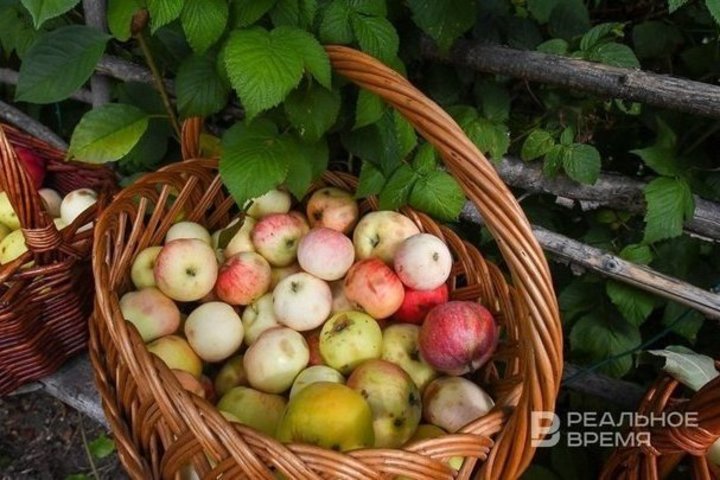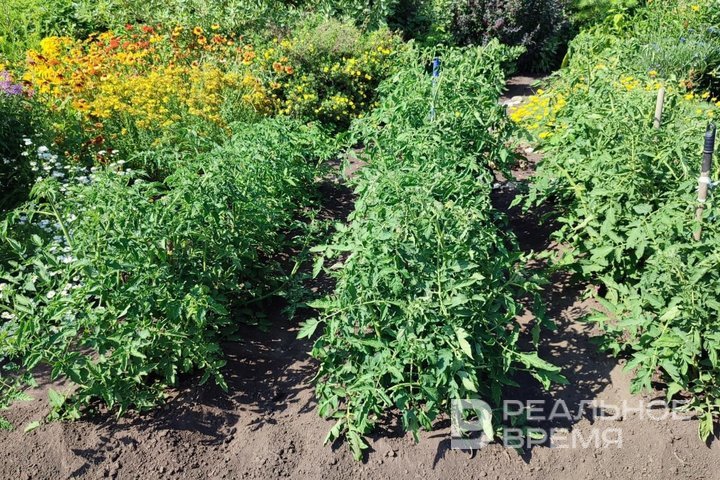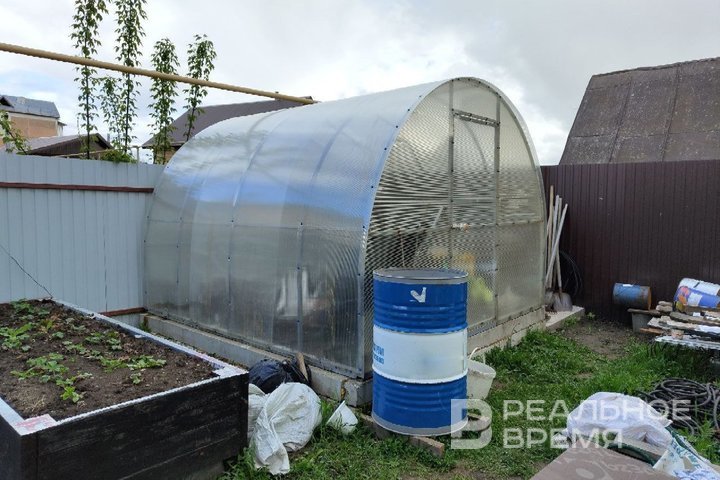Dacha is a job for Tatarstan women, while for men — primarily a resort
Special project of Realnoe Vremya and PromRating analytical agecny — about the perception of dachas and garden plots by Tatarstan residents

Almost one fifth of the Tatarstan citizens surveyed (19.4%) leave the city to live for the summer in dacha in the countryside. Almost the same number (20.4%) live permanently outside the city, including on the territory of garden associations. Interestingly, half of the women consider going to the coveted "6 acres” to be work, and the same number of men consider it primarily a vacation. Why does a citizen need a dacha, how does self-growing tomatoes and cucumbers keep prices down on the market, and what is the share of community garden products in the total volume of vegetables, fruits and berries consumed in the republic? Read more details in the special project of Realnoe Vremya and PromRating analytical agency, dedicated to gardening and horticulture in the republic.
Women take on more work at dacha
Today, a quarter of Tatarstan's population, or over 1 million people, are gardeners. Every summer they spend time on 30 thousand hectares of gardening and horticultural associations, mainly in the vicinity of Kazan, Naberezhnye Chelny, and Nizhnekamsk. Previously, most people spent weekends here to grow crops, but today many people have changed their attitude towards dachas and gardens. At least, this is what the survey of residents of the cities of the republic shows.
In the last decade of June, a study was conducted in Kazan on how Tatarstan residents perceive their dachas, garden plots and vegetable gardens, as well as how the products they grow help save the family budget. PromRating specialists interviewed* 400 citizens in Tatarstan and shared the results with Realnoe Vremya, and the answers in many cases surprised the researchers themselves.

In the survey, more than half of women (54.1%) replied that they consider going to dachas to be a work, and almost the same number of men (50%) said that they go to their land plot primarily to rest.
How fruits and vegetables from dachas help to reduce prices
The share of vegetables, fruits and berries grown by Tatarstan residents in the total volume of fruit and vegetable products consumed in the republic is not too high. At least, the experienced gardeners themselves from the profile association estimate it at the level of 5-10% in different local markets. Nevertheless, at the height of the season, it is quite acceptable to say that “every 20th tomato consumed in Tatarstan is grown in the dacha”.
At the same time, Tatarstan residents believe that their harvest helps to restrain prices for fruits and vegetables in markets and shops. More than a third (34%) of the study participants are absolutely convinced of this, and about a quarter of the respondents (23.6%) believe that this is more likely to be true. About 18.9% are not sure about such an impact on pricing policy, and 11.3% refute this. Experts, however, confirm that fruits, vegetables and berries grown in high season can indeed restrain general prices, but in the short term and locally.

“Indeed, taking into account the products that grow in Tatarstan in large volumes — apples, tomatoes, cucumbers, onions, greens, currants, possibly strawberries at their peak — all this, at least, is included in the calculations of the people who bring these fruits and vegetables. It seems to me that the price reduction is also happening because a large number of these products are being thrown onto the market," Anton Glukhov added.
Moreover, now gardeners have a parallel sales market — numerous chats of gardeners' non-commercial partnerships and horticultural non-profit partnerships in messengers and social networks, where people offer to buy an excess of grown vegetables and fruits. “When you tell sellers at the market that it is already in the garden, people start making discounts. Especially when it is a perishable product. If you bring four boxes of strawberries and do sell them in a day or two, the day after tomorrow no one needs them anymore. There is no escape except to sell at a lower price. This is also due to the pressure exerted by summer residents during the season," the speaker believes.

Tatarstan residents have reconsidered their attitude to the country
In recent years, there has been a trend in Russia when many residents of the country, including Tatarstan residents, choose a dacha as a place to spend their entire summer vacation. Most people just like this kind of pastime. Some of them rest in the garden, not based on preferences, but because they do not have or do not want to spend money on expensive resorts, especially foreign ones. The deterioration of the geopolitical situation has only intensified this trend.
Among the 400 surveyed citizens of Tatarstan, the majority (60.9%) reported that they have a dacha, a vegetable garden or a garden plot where crops are grown. One fifth of the participants (19.4%) confirmed their intentions to spend a long time in the dacha this summer. Another 4.6% are inclined to do the same. About 20.4% live permanently outside the city. However, the majority is not ready to settle in the garden for a long time — 38%.
“People's perception of the dacha and the idea of what needs to be done here changes over time. I remember when I was a child, in the 1990s, all the people in the dacha used to grow potatoes — it was really a matter of survival. They were preparing for winter because there was nothing to eat. My father worked as an engineer at the aircraft factory, and there was a problem with food — not only us, everyone was in the same position. There is no such thing now. And this famous question: is it better to grow or buy in a supermarket — it has been on the agenda for 10 years and is unlikely to disappear," Anton Glukhov noted.

The opinions of Tatarstan residents about how profitable it is to grow their own vegetables and fruits were divided approximately proportionally. “When they answer 50-50, in sociology it's hitting right on the bull's-eye. This means that there is the nerve of the people. We can highlight that there are people who come to the dacha to relax, and there are those who go to work because they cannot do otherwise. They keep the plots in perfect order, although it is difficult for them and their health no longer allows, but they will not allow any weed to germinate," the speaker noted.
But many respondents believe that a resident of the city needs a dacha today anyway. 43.1% are sure of this, and another 29.4% are ready to agree with them. Most men and women answered the question in the affirmative in about the same way, and only among those who answered in the negative, there were almost twice as many representatives of men. Another interesting fact is that not so much pensioners (42.9%) as middle-aged people (44.9%) definitely want to have their own garden or dacha.

Whether it is profitable to keep a dacha
The function of dachas and homesteads has changed significantly in recent decades. "20-30 years ago, gardens played a very large, significant role in supplying the population, but now their importance has sharply decreased. This also applies to planting potatoes and other vegetables. If earlier raspberries and strawberries were supplied from local orchards, now they are increasingly imported products from industrial plantations. As some people joke now: the best garden is the market," Rustem Shayakhmetov gives an example.
“In this matter, who sets themselves up how. If someone is set up to plant potatoes, some other vegetables and constantly works without straightening their backs, I think: this is wrong. In principle, some products can be bought on the market at a more affordable price. It's like fishing: a person has bought so much for it and spent gasoline that he gets a fish caught at a price of 5 thousand rubles per kg. Therefore, it is more reasonable to grow a little, for personal use, then it is profitable," Pavel Boyko believes.
At the same time, for the elderly population, the cherished "6 acres” still play a big role in life: “this is both a habit and a desire to do it”. Although from an economic point of view, it is much more profitable to buy vegetables and fruits than to grow them.
“Why is the number of livestock in private farmsteads being sharply reduced now? Because it is difficult to compete with high-end production. Therefore, there is less and less of own milk and meat. With the cultivation of berries and fruits, there is also a high level of manual labour. But pensioners do not take their work into account, only current costs — seeds, fertilisers. But what they do above — there are actually more expenses there. But for them, the dacha is important, it is their part of life, their worldview," the economist explains.

The younger generation has already formed a different approach, young people go to the countryside to relax: “The garden turns either into a suburban house or, if it is near a settlement, housing for permanent residence is built on the site. And this trend is going to increase.”
Is it environmentally friendly and healthy grown in the country?
Most Tatarstan residents consider it most important to plant tomatoes in the garden. About half of the respondents prefer cucumbers, potatoes and greens. Among the fruit trees, apple trees are in the first place, strawberries are in the lead.
Almost two thirds of Tatarstan residents (66.4%) necessarily make preparations from the grown crop for the winter, and about a fifth of residents roll up at least 20 three-liter cans. At the same time, almost half of the respondents (46.7%) honestly admitted to an excess of canned food. Despite this, people consider their own canned food to be healthy and environmentally friendly.
“Now they use various chemicals in the garden, the same manure is the second or third danger group. It seems to us, well, cows, we eat them, they are safe. In fact, manure is also a dangerous element. If used incorrectly as a fertiliser, it can lead to poisoning. Besides, I was surprised that so many people think that canned food are useful. A huge amount of sugar in jam and salt in pickles! It used to be necessary to keep at least some food until winter, so as not to starve to death. But then people switched that the products canned for the winter are beneficial. It seems to me that this can be questioned," Anton Glukhov believes.
The expert also doubts the safety of some products. Many respondents admitted that they store the canned food for three years — it is unlikely that pickles retain their useful properties during this period. “It seems to me that there is more harm than good here," the source concluded.
Another trend in recent years is the active rental of dachas for the summer. Tatarstan residents used the service massively even during the pandemic and self-isolation, but since then they have liked this lifestyle. Therefore, even working remotely, many people tend to move to the country for the summer, if conditions allow.
*A methodological Internet survey on a stratified random sample was conducted by PromRating analytical agency. Topic: “Perception of the use of plots for gardening and horticulture in rural settlements by residents of Tatarstan cities 2024".
The survey was conducted among 400 respondents-citizens from the Republic of Tatarstan in the period from June 21 to 28, 2024. The survey data is representative of the structure of use of the main social networks and reflects a cross-section of the opinions of the most active users of the main social networks. For this sample, the maximum error size with a 95% probability does not exceed 4.9% (95±4.9%). In addition to the sampling error, the wording of the questions and additional circumstances accompanying the survey may cause bias in the survey data.